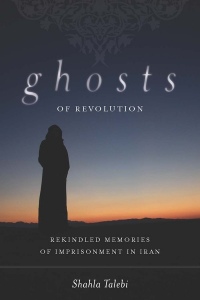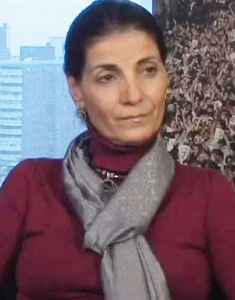News
The exploitation of revolutionary ideals in the Middle East
Shahla Talebi CN ’06 on the past and current unrest
This story appeared in our Fall 2014 newsletter. To view the full newsletter online, click here.
In the complexity of Middle Eastern affairs today, a 2006 Newcombe Fellow, socio-cultural anthropologist, and professor of religious studies explains, revolutionary ideals, religious commitments, and social tensions are mobilized and manipulated to serve groups with larger political agendas.
“What gets left at the end of the day is the suffering of the people, the erection of new prisons and torture, and, unfortunately, the curtailing of freedom,” says Shahla Talebi.
Dr. Talebi has a special perspective on the region and its difficulties. Now an associate professor at Arizona State University, she is a native of Iran who lived in Tehran during the Iranian Revolution and the Iran-Iraq War. She spent nearly a decade in political prison, first from 1977 to 1978 and again from 1983 to 1992, where she was subjected to physical, verbal, and psychological abuse. In 1998 she survived the mass execution of thousands of political prisoners, including her husband Hamid.
As a part of the movement in Iran, Dr. Talebi stood behind the struggles for social justice, democratic change, and an end to the dictatorship. According to Dr. Talebi, what started in the suburbs and the universities as a social justice movement, prior to and in 1978, turned into an Islamic Revolution, then a new wave of social, political, and cultural suppression by the new state in the name of Islam. Crackdowns paved the way for an even more authoritative state and, in part, for the Islamic movement. People mobilizing in the streets, she says, did not foresee these outcomes.
While the events in Iran were a “singular historical moment,” Dr. Talebi says, one may find some resemblance in the struggles that have since taken place elsewhere in the Middle East. “Yet what is happening in the region cannot be seen in isolation. The global politics, the war, occupation, neoliberal global economy they all play roles in the way the so called political Islamic movements have become more powerful and have gotten out of hand across the region.”
She cites as an example the Arab Spring movement in places like Tunisia and Egypt: Early on, demonstrators demanded more say in the economic and political landscapes of their countries, but “what was perceived as a move towards a more democratic response in most of those situations, unfortunately, really created a more authoritative state.”
Looking back at the Iranian Revolution, Dr. Talebi recalls the presence of minority groups fighting for their demands, “but it never reached the point of what now gets read as the Sunni-Shi’a conflict and [the religious and ethnic tensions] you saw in Iraq after the toppling of the Saddam Hussein regime.”
The much reported Sunni-Shi’a conflict is often framed as a centuries-old feud between Islam’s two largest branches. Dr. Talebi explains, however, that current conflicts are not simply a continuation of a schism that began 1,400 years ago. Rather, she considers them to have been escalated and exacerbated as a result of contemporary power relations and politics.
“When you put it in abstract terms, it all becomes about conflict,” explains Dr. Talebi. “To see these only as internal and inherent conflicts [between religious sects] would be missing other realities.”
For instance, she says, class differences shaped Iraq’s political realities before the fall of Saddam Hussein. Hussein, himself a Sunni, granted land, money, and other privileges to the Sunnis, creating economic divisions amongst sects. “That, of course, created resentments and hostilities,” she says. “These ideas were taken up by people who were trying to use those situations for political mobilization.”
While such prejudice and discrimination unquestionably exist in countries around the world, the difference in the Middle East is that such tensions and differences are exploited by groups with larger political-military strategies. “As much as there is a conflict between the Shi’a and the Sunni, there is a conflict between the haves and the have-nots, between the particular political powers and the ones who don’t have access to power,” says Dr. Talebi.
Dr. Talebi relocated to the United States in 1994 and—nearly 20 years after her first imprisonment disrupted her undergraduate work—earned her bachelor’s degree from UC Berkeley. She went on to complete master’s and doctoral degrees from Columbia University before joining the faculty at Arizona State, where she now teaches in the School of Historical, Philosophical and Religious Studies and is the Islamic Studies Program Coordinator.
 In 2011, Dr. Talebi published a memoir of her time as a political prisoner, Ghosts of Revolution: Rekindled Memories of Imprisonment in Iran (Stanford University Press). The book won the 2011 Outstanding Academic Title Award given by Choice Magazine.
In 2011, Dr. Talebi published a memoir of her time as a political prisoner, Ghosts of Revolution: Rekindled Memories of Imprisonment in Iran (Stanford University Press). The book won the 2011 Outstanding Academic Title Award given by Choice Magazine.
Currently Dr. Talebi is exploring the lingering fear and sense of imprisonment that stay with former Iranian political prisoners. She has subjects who, while they now live outside of Iran, still feel they have to disconnect themselves and guard what they do or say about Iran. “It’s a situation of a prison expanding beyond its borders,” she says. She then looks at the creation of memory and histories under these circumstances—“a version of memory that considers these complex dynamics of persecution and how that impacts the way one tells a story, written and oral.”
Asked what Westerners should consider to understand current events in the Middle East more fully, Dr. Talebi recounts a Farsi proverb her mother used to repeat: “When you’re trying to poke a big needle into someone’s body, always first poke a small needle into your own body.” Her gloss: It’s not possible to intervene effectively with others if you have not first examined and understood your own experiences. “Let’s learn about what’s happening in our own back yard first—really deal with it and really understand what’s going on—before focusing on the others.”


